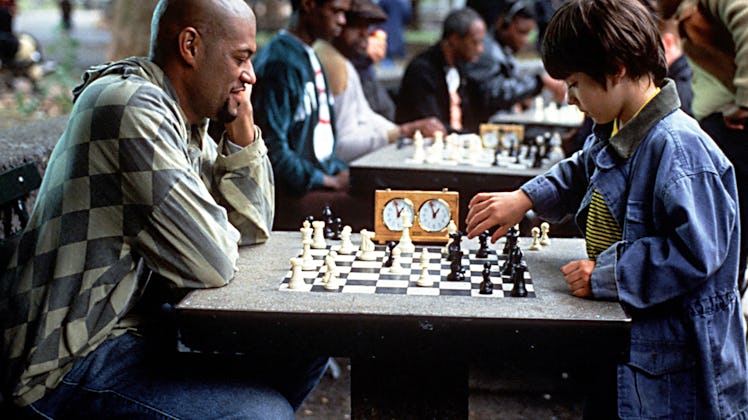How To Raise The Next Bobby Fischer (Or Just A Kid Who Plays Chess Better Than You)
You're just a pawn in their game.

For more advice on fun stuff to do with your kids, from ridiculously overqualified experts, check out the rest of our 940 Weekends.
When it comes to family game night, it’s understandable if you want to play Battleship or Jenga or all the other games where you can already crush your kid, but you might want to consider introducing chess into the mix. The game can improve your kid’s concentration, memory, creativity, and critical thinking skills — and it can even turn into a nice little side hustle.
Nathan Whipple a teacher with NY Chess Kids and a competing member of the Marshall Chess Club, which is one of the oldest in the country. But, he didn’t learn his moves in a chess club or school — his love of chess comes from his dad (hint, hint). These are his recommendations for getting your own kid to fall in love with the Game Of Kings.
Start Them In Kindergarten
Whipple recommends breaking out the chess board as early as age 4. “It’s like a language. Earlier in life it’s easier to learn different languages, and after that it becomes harder. So, it’s important that you do it younger if you can.” And girls might have a gender advantage: “Some kids get it right away, and some just don’t and it takes longer. I’ve noticed that girls are able to understand strategy faster,” says Whipple. The Queen isn’t the most powerful piece on the board for nothing.
Flickr / ShoobyDooby
It’s Not Checkers (Unless It Is)
If you want to sound like a Grandmaster, explain to your kid that they don’t have to be playing chess to play chess. For Whipple, there are lots of slightly less complicated games that can be a good gateway. “Checkers is a real game. It has openings and an end-game strategy. Just make sure you’re playing it correctly,” says Whipple. That means no weird triple kings just to mess with your kid’s mind. Other games that can get them thinking strategically using memory tactics in ways similar to chess include backgammon and bridge, but be careful with the latter — you’re trying to raise a genius, not a retiree.
Pick Up The Pieces
“If they’ve never learned [how to play] at all, you have to show them how the pieces move on the board,” says Whipple. “It takes a few times for them to get it. Show them a bunch of positions, and then brainstorm together if there are defenses to the checks.”
Because you have no idea what he just said means, Whipple says to also pick up a copy of Bobby Fischer Teaches Chess. Now you know the difference between Stalemate, Pawn Promotion, Castling, En Passant, and the biggie, Checkmate. Although, it may take a few reads to absorb. Uh … look, there’s a Chess For Dummies!
Wikimedia Commons
Make It An After-Dinner Ritual
Instead of Netflix n’ children at night, consider playing a few games of chess as your new bonding activity. “I always encourage kids to ask their parents to play, because it’s a good way to bring the family together,” says Whipple. “A chess board is an opportunity to put down the phones for a bit, take some special time and connect.”
Can’t Beat The Computer
Whipple recommends ChessKid.com for tutorial videos, practice games, and opportunities to play other kids from around the world. “Ideally you want to play with them, or find a good partner to play at school — but some kids need the computer because nobody else is good enough,” says Whipple. It’s just one more way robots are making you obsolete.
Flickr / Travisty
Encourage Some Healthy Competition
Scout out competitions through their school, USChess.org, and possibly even that weird store on the corner where middle-aged men play Magic: The Gathering. Tournament groupings start as young as Pre-K. “It’s pretty loose and open, and they’re making a lot of bad moves at that age. But, just let them do it to see what a tournament is,” says Whipple. “At the kindergarten level they might even play 40-minute games. They get really zoned in, and sometimes they can keep going and going.” And if some of the other dads want to make prop bets, who are you to say no?
Chess Builds Character
Sportsmanship doesn’t just apply to sports. Every kid wants to win, but the more important lesson you teach them is how to lose graciously. The first step to doing that: Stay in the lobby. “Parents are often not allowed in the tournament halls because they start interfering with the game, motioning to make certain moves,” says Whipple. Don’t be one of those stereotypical chess dads who can’t keep his shit together. So the kid didn’t play pawn to rook 4 — let it go, man.
This article was originally published on